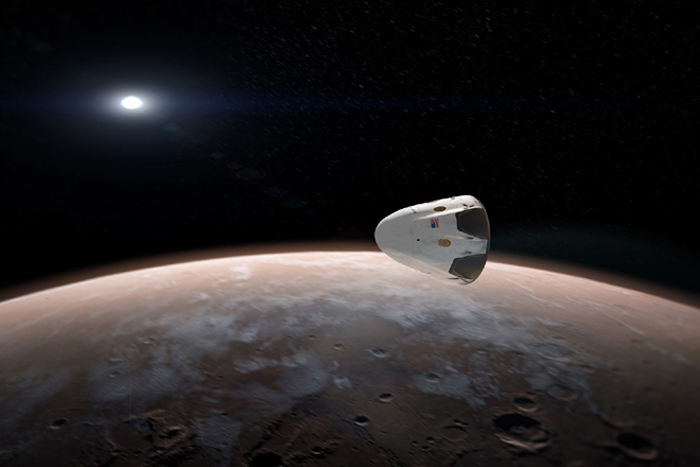Will SpaceX Get People to Mars Before NASA?

Breaking space news, the latest updates on rocket launches, skywatching events and more!
You are now subscribed
Your newsletter sign-up was successful
Want to add more newsletters?
Billionaire tech entrepreneur Elon Musk, never one to rest on his laurels, recently laid out the opening move in his long-term quest to land people (himself included) on Mars.
The plan begins with a Dragon capsule, similar to one of the cargo ships now parked at the International Space Station, blasting off for Mars aboard a SpaceX Falcon Heavy rocket as early as 2018.
The Falcon Heavy, which will have 27 first-stage engines, compared to the nine aboard SpaceX's current Falcon rocket, is scheduled for its first flight before the end of this year. Falcon Heavy will be the most powerful U.S. rocket to fly since NASA's Saturn 5 moon rockets of the 1970s.
SpaceX Targets 2018 for First Mars Mission
NASA, which was an early supporter and primary customer of Musk's Space Exploration Technologies, or SpaceX, was quick to respond to his Mars announcement with a statement of support and the disclosure of an agreement offering technical support.
NASA, after all, has successfully landed spacecraft on Mars seven times.
SpaceX, which has multibillion-dollar contracts with NASA to fly cargo and crew to the space station, won't be getting financial support from NASA for its debut Mars mission, known as Red Dragon.
Breaking space news, the latest updates on rocket launches, skywatching events and more!
The prospect of SpaceX's self-financed journey to Mars, one which Musk clearly intends to develop to the point of landing people, casts new light on NASA's own Mars program. The project costs NASA about $4 billion per year and does not yet include development of a habitat for deep-space travel or a vehicle to land and then take off again from the surface.
PHOTOS: Lesson of SpaceX Rocket Landing: Try, Try, Try Again
For now, the agency is focused on developing the multipurpose deep-space Orion capsule and a heavy-lift rocket, known as the Space Launch System. The capsule and launcher will be tested together for the first time during an unmanned flight around the moon in November 2018. A follow-up test flight with astronauts aboard is targeted for 2023, setting the stage for a human mission to Mars in the mid-2030s.
Which begs the question: Will SpaceX be there first?
"I hope that Space X and NASA — perhaps in a role more … as advisor instead of NASA as operator — will work together in global harmony to jointly land humans on Mars," astronaut Buzz Aldrin wrote in an email to Discovery News.
Aldrin, one of 12 Americans to walk on the moon, has developed a plan to colonize Mars.
Musk: SpaceX Making 'Progress' Toward Mars Colony
Bob Zubrin, another long-term advocate for Mars settlement, said he thinks its possible SpaceX may land people before NASA and "probable" that U.S. astronauts will ride as passengers to Mars on SpaceX vehicles.
SpaceX intends to use a new landing technology called supersonic retro-propulsion, which has never been demonstrated on Mars.
"I wouldn't bet against SpaceX eventually landing a Dragon on Mars, but it is 300 miles to send the Dragon to the space station. Mars is 150 million miles away and has a thin atmosphere to deal with. (The) degree of difficulty is way, way higher," Scott Hubbard, a consulting professor at Stanford University and former director of NASA's Ames Research Center in California, wrote in an email to Discovery News.
Hubbard, who also served as NASA's first Mars program director, said several critical technologies must be matured before anyone steps foot on Mars, including high-power solar electric propulsion for cargo and resupply ships and a deep-space habitat and life support systems for crews during the rides to and from Mars, which take between six and nine months each way.
"Humans to Mars is such a complex and difficult undertaking that I expect an successful mission to be collaborative — maybe public private partnership, maybe multinational, maybe all of the above," Hubbard said.
More details of Musk's Mars plan are expected to be unveiled at the International Astronautical Congress in September.
Originally published on Discovery News.

Irene Klotz is a founding member and long-time contributor to Space.com. She concurrently spent 25 years as a wire service reporter and freelance writer, specializing in space exploration, planetary science, astronomy and the search for life beyond Earth. A graduate of Northwestern University, Irene currently serves as Space Editor for Aviation Week & Space Technology.
